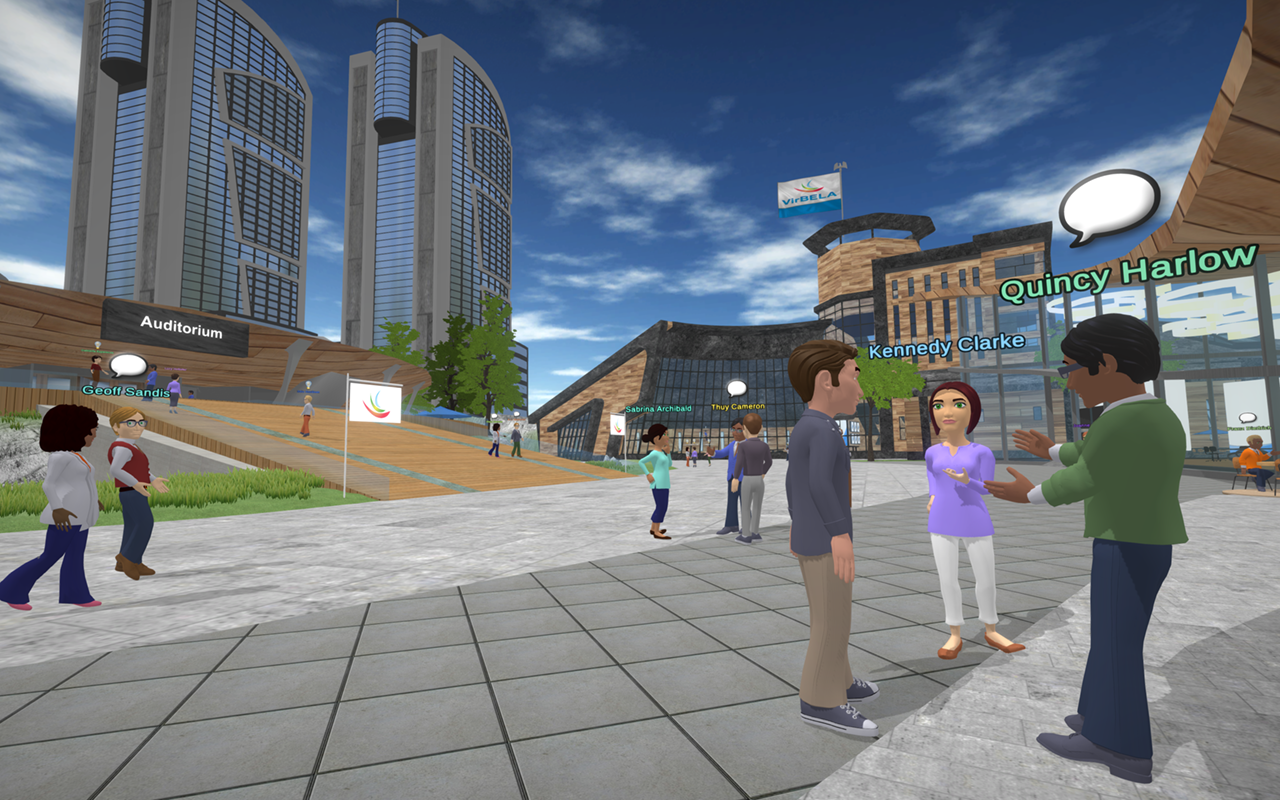VirBELA Brings the Virtual Reality Workplace to the Real World
Software Developed at UC San Diego Unites People Around the Globe
Published Date
Article Content
VirBELA is a virtual reality company that connects remote workers from around the world in an online environment. They work, collaborate and talk exactly as they would do in the real world, except there is no commute and no one has to wear a tie (although you can change your avatar’s clothes each day). Recently acquired by eXp World Holdings, the company was formed at the University of California San Diego as a partnership between Rady School of Management and the Experimental Game Lab.
The company began in 2012, after co-founders Alex Howland and Ron Rembisz won a GMAC grant for $1.74 million dollars to explore the concept of a virtual workplace. Howland connected with Sheldon Brown, director of UC San Diego’s Experimental Game Lab (since renamed the Center for Multicore Productivity Research, a part of the Arthur C. Clarke Center for Human Imagination) and Erik Hill, who worked in the Game Lab while pursuing his graduate degree and is now VirBELA’s vice president of engineering.
The original idea was to build an application on top of existing technology. Brown and Hill acted as advisors, while Howland sought a software platform. Howland, however, wasn’t able to find a suitable company to work with, everyone either telling him what he wanted wasn’t possible or else prohibitively expensive. Brown and Hill told him it was possible and if he could be patient, they would build exactly what he wanted.
Technology in place, VirBELA launched with the initial intent of serving MBA students, providing an opportunity to work on teams across cultures where they could safely take risks and gain experience. The company ran a $50,000 competition where teams competed to have the most profitable virtual car dealership. The competition was a success and the event garnered interest from other companies interested in virtual work worlds.
VirBELA left Rady at the end of 2014 and moved across campus to the Qualcomm Institute (QI). Howland is thankful for the innovation ecosystem he found at the university: “Kudos to UC San Diego. Our research started inside the university, and then they helped us spin out the company. They leased us space in QI right after, allowing us to spend our money on good talent, rather than real estate. Not to mention that basically all of our engineers were recruited from campus.”
UC San Diego Extension’s Director of Strategic Innovation and Education Technologies Cynthia Hanson says she actually heard about the company from a neighbor and felt that “the second I saw it, I knew this was the future.” Extension uses VirBELA in a business communications course, and Hanson admits there is a learning curve for instructors and students who haven’t operated in a 3D-immersive environment before. In the end, though, she states, “it enriched the overall learning experience by promoting collaboration, stimulating discussion and creating a feeling of spatial togetherness — components that some find lacking in today’s online learning modalities.”

VirBELA's virtual workplaces can include shorelines and speedboats.
eXp Realty was an early adopter of VirBELA, and its parent company acquired VirBELA in 2018. “Our more than 18,000 agents and hundreds of staff use our virtual environment to communicate and collaborate from any location. It allows the company and agent teams to save on the cost of bricks-and-mortar offices. VirBELA provides the virtual collaboration, education and support our agents need to grow their businesses,” says eXp Realty Vice President, Marketing and Communications, Cynthia Nowak.
What is it like inside VirBELA’s virtual workplace? Think of it like a large sunny university or corporate campus. There are communal meeting spaces where employees can have impromptu chats; auditoriums that can hold hundreds (and can quickly expand if more space is needed); offices where leadership can schedule meetings; and, of course, the speedboat. Yes, there is a speedboat, great for informal discussions or just a quick break from the workday.
Not content to let the product collect dust on the shelf, Howland and Hill think there is plenty of room for innovation: better accessibility across devices; avatars that can recognize and mimic users’ facial expressions; and data analytics. They both agree there is potential to use the virtual workplace to gather data on how employees work as individuals and teammates and whether certain dynamics are more indicative of success.
Hill says he’s amazed that more than 10,000 people use VirBELA’s platforms each month: “It’s kind of amazing to see them spend their work days in this technology we built. I hope I’m making their lives better because of it.”
Paul Roben, associate vice chancellor for UC San Diego’s Office of Innovation and Commercialization states, “Virbela exemplifies how the university can support a business from ideation to startup, acquisition and beyond. We offer a full suite of services to our entrepreneurs and are extremely pleased that VirBELA has made such good use of them. We hope they continue their path of success.”
Share This:
You May Also Like
Stay in the Know
Keep up with all the latest from UC San Diego. Subscribe to the newsletter today.




